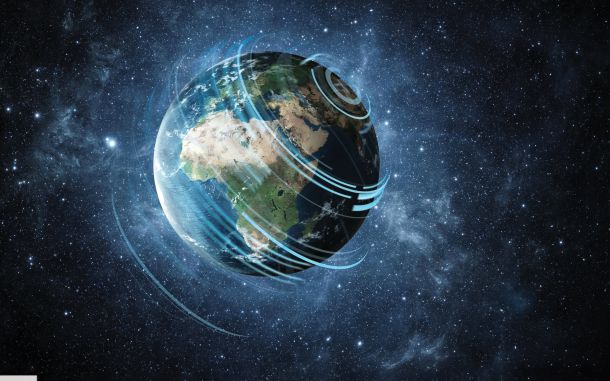Computational Universe Theory
- The idea of a computational universe appears to be new, but its origins go back to antiquity. Some of history’s greatest minds, such as Plato and Descartes, have actually provided their views on this concept even without these technologies being present at the time.
- The scientific community explains the order and design in the universe with concepts such as the “Anthropic Principle.”
- The concept of a “mother computation” placed on duty in the functioning of our universe is not just a singular subject but instead a comprehensive set of ideas people have focused deeper.

In This Article
-
The idea of a computational universe appears to be new, but its origins go back to antiquity. Some of history’s greatest minds, such as Plato and Descartes, have actually provided their views on this concept even without these technologies being present at the time.
-
The scientific community explains the order and design in the universe with concepts such as the “Anthropic Principle.”
-
The concept of a “mother computation” placed on duty in the functioning of our universe is not just a singular subject but instead a comprehensive set of ideas people have focused deeper.
The questions on the creation of mankind and the inner workings of the universe have been the primary issues that have had a profound impact on both modern, secular philosophy and traditional religion. Our collective experiences in natural sciences and educational disciplines have taught us that certain models can be developed to help us comprehend the functioning of the universe.
One of the fundamental questions in this respect relates to how a great deal of orderliness and discipline is possible in the universe despite its immense scale. Exploring the potential of this orderliness encourages our curiosity to examine life at the most minuscule level, and some scientists aim to explain this perceived system within the universe via an idea called “the Computational Universe.” In this article we will discuss how this idea can be considered to support the perceptions of monotheistic belief. In scientific literature, the term “computational” refers to anything that possesses any relationship to complex calculations, as various disciplines such as physics, chemistry; the term is used even by the discipline of psychology.
Thanks to relatively recent developments and discoveries in science, we are able to better understand the events in our world and universe. To put it into perspective, humanity was deprived of certainty on the shape of the world up until several centuries ago. However, scientific developments, especially during the 19th and 20th centuries, formed the basis of the stunning technological developments that we live with today. Comparatively, it could be argued that what we know, comprehend, and understand about the universe that we live in is only a small fraction of what the universe actually contains. Continuous developments in science and technology help us understand more and more about the way the universe works. “Our science and applications to space technology have evolved by improving our abilities to measure, test, and analyze physical events and by developing their mathematical models” (Fontana 2005).
As humanity began to uncover some of the codes by which our universe is made to function, we have been using these rules to make our lives easier. This is common human behavior: we learn new things and try to use them to improve our lives. In fact, human technology has advanced so much that we now have machines that can move and function like a nano-universe. Basically, we are giving them a code, a sheet of rules to function in the way we desire. As a result, we are much less dependent on physical labor; for instance, we now can farm with high-tech machines instead of our hands.
New ideas are born with these emerging technologies and with more ease than they were back in the old days; thus we have had a progress at an exponential rate. Looking at all these historical aspects and experience , some scientists conclude that the universe we take part in might be a “mother computation” and all of these things that keep the universe well-oiled and functioning might be parts of codes and commands coming from this mother computation.
The argument does not end at whether we live in a computation or not though. From that point, people who believe that we live in a mother computation split sides, with some providing the explanation that we are real, and this is reality, but controlled by a mother computation. This group argues that everything that happens around us is part of reality, just like we are, but that they function via a code that was inserted into their cores in order for them to work the way their coder wants them to.
The other school of thought challenges the vast majority of conventional theological thought and logic. This argument agrees that we do live in a computation, however that this life is not reality. Events in the universe, including our lives are just a simulation, and we are test subjects.
“Several physicists, cosmologists and technologists are now happy to entertain the idea that we are all living inside a gigantic computer simulation... Our instincts rebel, of course. It all feels too real to be a simulation. The weight of the cup in my hand, the rich aroma of the coffee it contains, the sounds all around me – how can such richness of experience be faked?” (Ball 2016).
Though this idea of a computational universe appears to be new because of the fact that computers and digital simulations appeared only a few decades ago, its origins go back to antiquity. Some of history’s greatest minds, such as Plato and Descartes, have actually provided their views on this concept even without these technologies being present at the time. They questioned reality and dug deep into life and how we perceive everything around us, however their arguments were not widespread among their contemporaries because they had no proofs to support their controversial ideas that challenged everything that people believed.
So, is the universe a mother computer or a giant computer simulation?
It is widely accepted by almost all people that there are principles and rules by which the universe is governed and which we can observe on both the macro and micro levels. Events are considered supernatural or miraculous if they take place outside of these principles. Therefore, scientific findings may allow us to develop a deeper appreciation for the “computational” orderliness that can be found in our universe among the orbits of the planets down to the multitude of complex ecosystems that exist across our world in a variety of different biomes.
Religious traditions
From the perspective of monotheistic religions, it is believed that the Creator creates and pursues everything with an order in the universe, which allows the universe to keep working in a perfect balance. The universe’s orderliness, especially that which occurred during its creation, is stressed profoundly in the holy books. For example, it is stated in Genesis 1-2 that the creation of the entire universe occurred in “six days,” and this process was described day by day in the relevant verses. This implies a certain order in the development of events during the creation of the universe.
A certain orderliness is also clearly declared in the Qur’an: “He to whom belongs the dominion of the heavens and the earth … has created each thing and determined it with [precise] determination” (2:25). Today, the scientific community explains this order and design in the universe with concepts such as the “Anthropic Principle.” According to this principle, the universe possesses such perfect features that it could not have arisen by chance without purpose. The situation can be understood more thoroughly if major examples of design existing in the universe are briefly examined. Doing so, we will find out several aspects of this principle that we encounter in our daily lives, which in turn will lead us to further understand God’s complex creation of the universe.
Based upon the evidence that some scientists have shown that a starter leads off, like a coder writes codes, in order for the universe to function correctly and in a perfect continuity, the faithful of religious traditions might reasonably suggest that this entire universe is just like a computer created by the Creator who continuously controls it by constantly creating new every moment for it to function as the codes are based on His commands. This rationale is the essence of and consistent with not only monotheistic religions but also in many ways with other belief systems.
Overall, the concept of a “mother computation” placed on duty in the functioning of our universe is not just a singular subject but instead a comprehensive set of ideas people have focused deeper. While, according to some, there is indication for the universe being a reality and being controlled by a “computer,” according to others, there might also be indication for how the universe could also just be a simulation. A team of physicists working at the University of Bonn claim that they have come up with a measurable way of showing that our universe is indeed “simulated” (Yirka 2012). The main focus of their paper is that in order to create a simulation of our universe, there has to be a three-dimensional framework to represent real world objects and processes. But the problem is, this paper is based on only what we know of reality today. This means that an exact copy of our universe would be impossible to create until the end of time, when we have all the knowledge that the universe presents us with – the entire idea splits right at this point.
Religion also becomes a separate argument along with these two different beliefs. Monotheistic religions believe in an Almighty God, who creates ex nihilo and put things in order in a perfectly “computed” order. God, in these traditions, are also believed to sustain all the existence by constant governance; as a matter of fact, everything is an outcome of the manifestation of God’s names and attributes – nothing comes out outside of His Divine realm and authority.
With there being many more religious traditions and philosophical approaches in this world, many different ideas can emerge as possible theories. In regard to the idea of the world being a computation, scientific theoreticians cannot definitively know for sure whether we live in a computational or fundamental reality, and do not speculate on who might be the one who programs this computer that way. Religious traditions, however, take one more step and claim if there is a computation, then there must be an agent who makes it possible and wills the world to be as it is rather than something else. Otherwise, claiming the universe to be a mother computer on its own would be no different than believing in nature to be the creator of everything, as opposed to nature itself being a created being.
While the computational model seems to support the arguments of believers in terms of explaining that there is an established order in the universe and that this order operates within certain laws and rules created and maintained by a creator in a perfect continuity, thinkers and philosophers may come up with different explanations in their own words and formulations to understand creation and life as we know it.
The mysteries of the universe offer us an expansive space to bring about the best of our rational and spiritual capacities, so our existence in this life becomes a meaningful one.
References
- Giorgio Fontana. “Why we live in the Computational Universe,” https://arxiv.org/ftp/physics/papers/0511/0511157.pdf.
- Philip Ball. 5 September “We might live in a computer program, but it may not matter” http://www.bbc.com/earth/story/20160901-we-might-live-in-a-computer-program-but-it-may-not-matter.
- Bob Yirka. 2012. “Is it real? Physicists propose method to determine if the universe is a simulation,” Phys.org.









